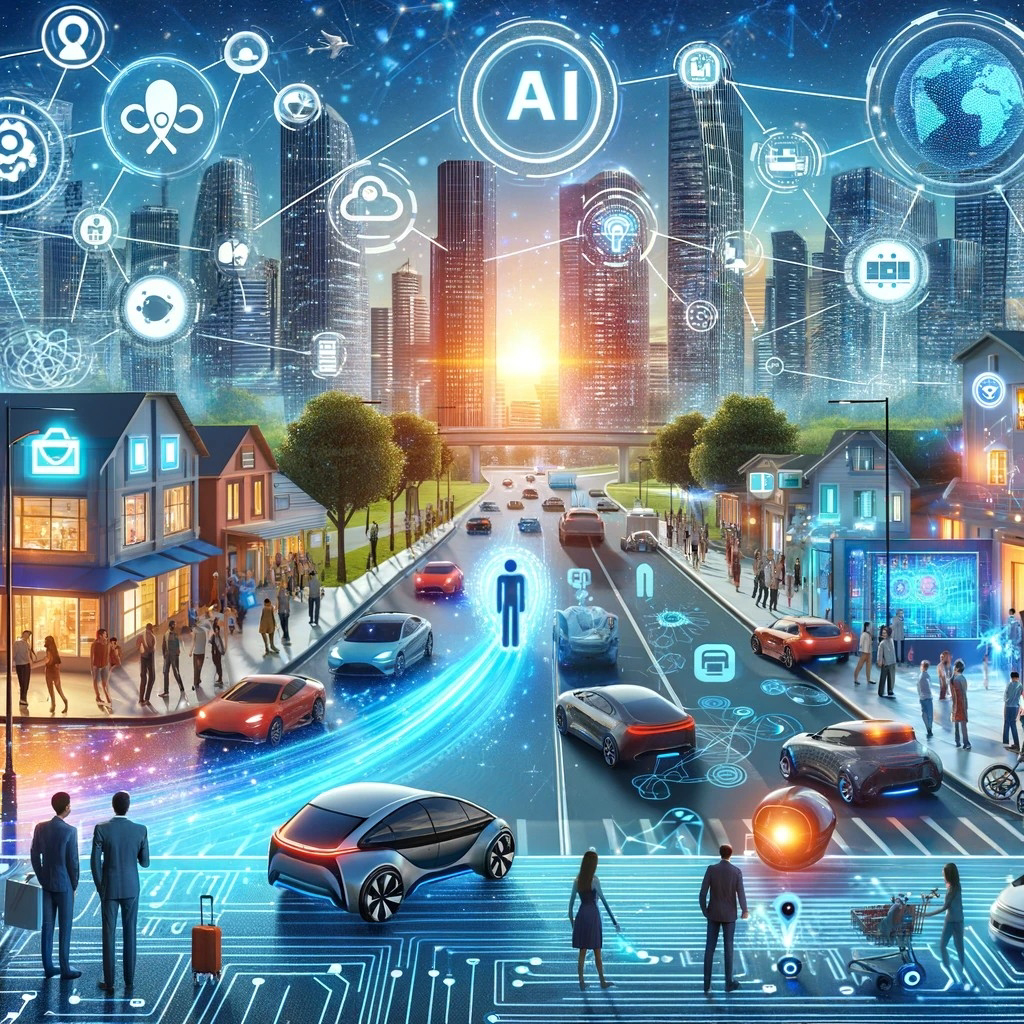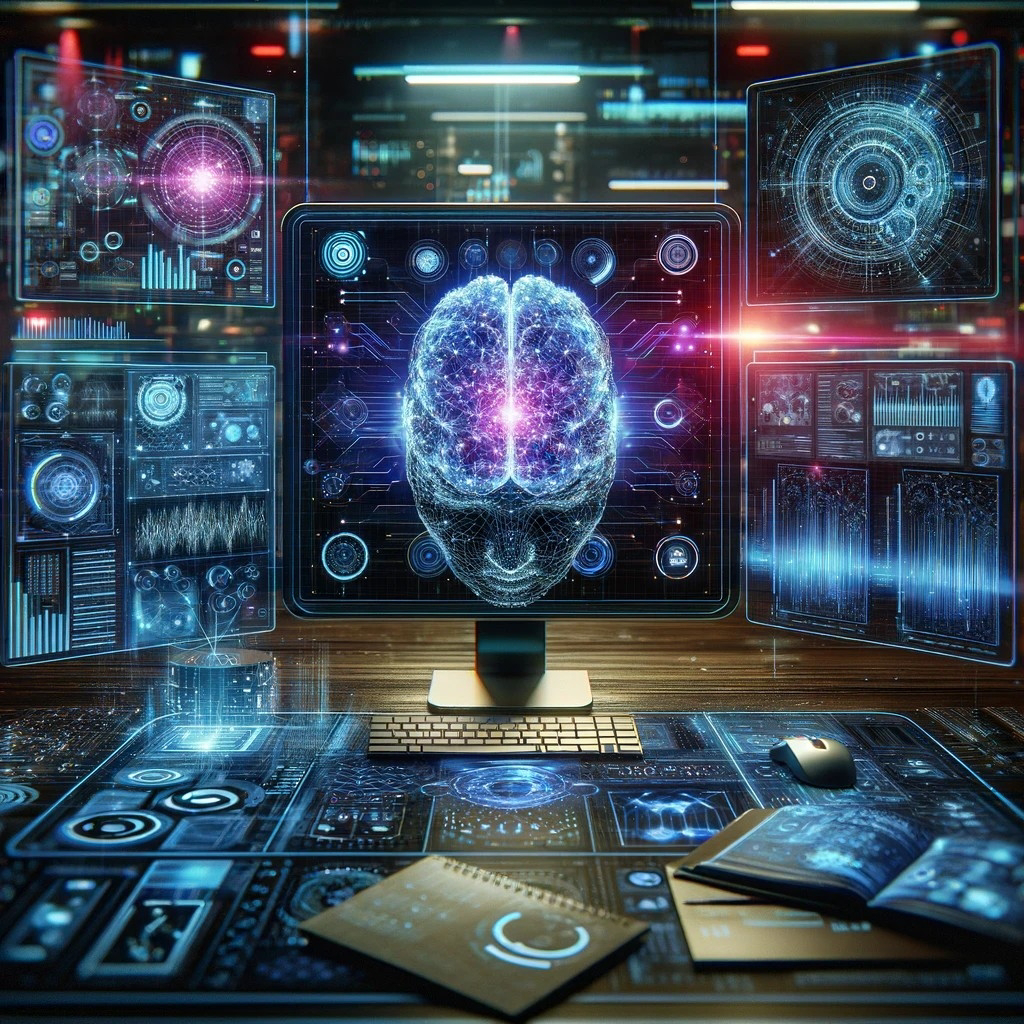The Future is Now: AI's Pervasive Influence Across All Aspects of Life
In an era where technology intertwines with daily life, Artificial Intelligence (AI) stands as a monumental force, reshaping our existence. This blog post further delves into the advanced uses of AI across diverse sectors, highlighting its significant role in shaping our future.
Military and Defense: The AI Vanguard
AI's impact on military strategy is profound. It's not just about enhanced weaponry, but also about strategic decision-making. AI algorithms simulate complex combat scenarios, aiding in the development of robust military strategies. This capability enables armed forces to stay several steps ahead of potential threats.
AI also plays a critical role in intelligence gathering. By analyzing satellite imagery and intercepting communications, AI systems can uncover critical information, crucial for national security. This intelligence is key in preemptive defense strategies and in safeguarding nations against emerging threats.
In training and simulation, AI offers realistic and adaptable scenarios, preparing soldiers for a wide range of situations. These virtual environments are vital for training in tactics, combat, and crisis management, ensuring preparedness for real-world challenges.
Moreover, AI in logistics transforms the efficiency of military operations. From optimizing supply chains to managing inventory, AI systems ensure that resources are maximized and available where needed most, crucial in time-sensitive military contexts.
Science and Space Exploration: AI's Boundless Frontiers
AI is pivotal in decoding the vast mysteries of the universe. By processing astronomical data, AI aids in the discovery of new planets and stars, and even in the search for signs of extraterrestrial life, expanding our understanding of the cosmos.
In environmental science, AI models are crucial in understanding climate change. They predict future climate patterns and assess the impact of human activities on the environment, providing valuable insights for sustainable practices and policies.
In particle physics, AI is accelerating discoveries about the fundamental components of the universe. It analyzes data from particle accelerators, identifying patterns and anomalies that could reveal new physics, pushing the boundaries of our understanding.
AI's contribution to genomics is reshaping our approach to biology and medicine. By analyzing vast genomic datasets, AI is uncovering new insights into genetic diseases and traits, paving the way for personalized medicine and advanced genetic therapies.
Healthcare: AI's Holistic Impact
In mental health, AI provides innovative approaches to treatment. It assists in diagnosing mental disorders more accurately and offers digital therapeutics, such as AI-powered apps and chatbots, providing accessible mental health support.
AI in genomics is revolutionizing personalized medicine. By analyzing a patient's genetic makeup, AI helps in tailoring treatments and medications, enhancing their effectiveness and reducing side effects, thus personalizing healthcare at a molecular level.
In medical imaging, AI enhances the accuracy and speed of diagnoses. It interprets X-rays, MRIs, and CT scans more rapidly than human radiologists, detecting anomalies and diseases early, which is critical in effective treatment planning.
AI also plays a crucial role in public health. It tracks disease outbreaks, predicts their spread, and informs public health responses. During pandemics, AI-driven models are essential in understanding the dynamics of disease transmission and in formulating effective containment strategies.
Robotics: AI's Expansive Reach
In industrial automation, AI-driven robots are revolutionizing manufacturing. They perform tasks with precision and efficiency, adapting to changing environments and demands, significantly enhancing productivity and safety.
AI in search and rescue robots is saving lives. These robots navigate through hazardous environments, locate victims, and deliver aid, performing tasks too dangerous for humans. They are crucial in natural disasters, accidents, and other emergency situations.
In the service industry, AI robots are transforming customer experiences. They provide assistance, information, and even entertainment, personalizing interactions and enhancing customer satisfaction in sectors like hospitality, retail, and healthcare.
In agriculture, AI-powered robots are optimizing farming practices. They perform tasks like planting, weeding, and harvesting with precision, and use data analytics to improve crop management, contributing to sustainable and efficient agriculture.
Education: AI's Transformative Role
AI is revolutionizing language learning. It offers personalized learning experiences, adapting to individual proficiency levels and learning styles. AI-driven language apps and platforms provide interactive and immersive learning environments, making language learning more accessible and effective.
In special education, AI offers tailored learning solutions for students with disabilities. It adapts educational content to suit various learning needs, providing assistive technologies that enable these students to engage effectively with their curriculum.
AI in educational administration is streamlining processes. It automates tasks like enrollment, scheduling, and record-keeping, allowing educational institutions to focus more on teaching and student engagement, thus enhancing the overall educational experience.
AI also plays a role in educational content creation. It helps in developing interactive and engaging learning materials, such as simulations and educational games, making learning more engaging and effective for students of all ages.
Culinary Innovations: AI's Culinary Mastery
In food safety and quality control, AI systems monitor and analyze production processes, ensuring the highest standards are maintained. From detecting contaminants to ensuring consistent quality, AI's role in maintaining food safety is crucial in the culinary industry.
AI in nutrition analysis is personalizing dietary recommendations. It analyzes individual dietary needs and preferences, suggesting meal plans and recipes, aiding in achieving specific health goals, and catering to dietary restrictions.
In the realm of food delivery and logistics, AI optimizes routes and delivery schedules, ensuring fresh food reaches consumers efficiently. This optimization reduces food waste and enhances customer satisfaction in the fast-paced world of food delivery services.
Moreover, AI is influencing beverage production, particularly in brewing and wine-making. By analyzing data on fermentation processes, taste preferences, and environmental factors, AI assists in creating beverages that cater to evolving consumer tastes, combining tradition with technology.
Everyday Life: AI's Deep Integration
In entertainment, AI is not just recommending content but also creating it. AI algorithms compose music, write scripts, and even assist in film and game production, pushing the boundaries of creativity and offering new forms of entertainment.
AI's role in smart homes extends to security and energy management. It monitors home environments, ensuring safety and optimizing energy use, leading to smarter, safer, and more sustainable living spaces.
In transportation, AI is revolutionizing travel and commuting. From optimizing public transit schedules to managing traffic flows, AI is making transportation more efficient and environmentally friendly. The advent of self-driving cars, powered by AI, promises to transform our travel experiences even further.
AI also plays a significant role in personal wellness and fitness. From AI-driven fitness apps that tailor workout plans to smart wearables that monitor health metrics, AI is making personal health management more accessible and effective.
The Challenges and Ethical Considerations
Ensuring AI transparency is vital. As AI systems make more decisions, understanding their reasoning processes is crucial for trust and accountability. This requires developing AI systems that are not just intelligent but also interpretable and transparent.
The social impact of AI, particularly on privacy and surveillance, is a growing concern. Balancing the benefits of AI-driven monitoring with the right to privacy is essential in building a society that values both security and individual freedoms.
Conclusion: Embracing a Responsible AI Future
In conclusion, AI's integration into our lives and industries is profound and multifaceted. As we step into an AI-augmented future, the focus must be on leveraging AI's potential while addressing its challenges. By fostering a responsible approach to AI development and deployment, we can ensure a future where AI not only advances our capabilities but also enhances our human experience.
This exploration into the multifarious roles of AI across different sectors underscores its transformative impact. AI is not just an auxiliary tool; it is becoming a foundational component of our society, shaping a future that is innovative, efficient, and profoundly human-centered.
For more content visit:












Comments
Post a Comment